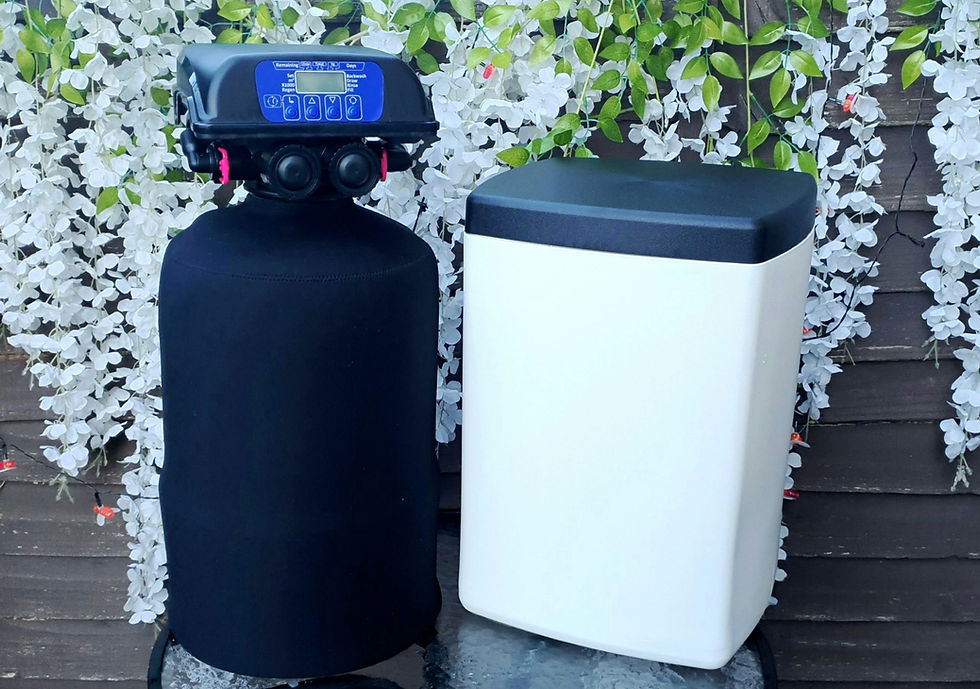The hard truth about eczema: it's something in the water
- Andy McPhilbin
- Oct 26, 2018
- 3 min read
Updated: Oct 27, 2018
Could it be caused by hard water?
Hard water damages our protective skin barrier and could contribute to the development of eczema, a new study has shown.
Researchers from King’s College London and the University of Sheffield have discovered that exposing the skin to hard water damages the skin barrier – which is our defense against outside threats such as bacteria or sun burn – and increases the sensitivity of the skin to potential irritants found in everyday wash products such as soap or washing powder.
Hard water contains high levels of calcium and magnesium ions that bind to surfactants such as sodium lauryl sulfate (SLS) and sodium lauryl ether sulfate (SLES) – which act as detergents or wetting agents – making them insoluble, so they precipitate onto the skin.
Skin pH is normally acidic but hard water has high alkalinity which means it can raise the skin surface pH. A shift towards alkaline pH disturbs the skin’s natural function as a physical barrier and leaves it prone to colonization by potentially pathogenic bacteria which can cause infection.
Co-senior author of the study, Dr Carsten Flohr from the St John’s Institute of Dermatology at Guy’s and St Thomas’ NHS Foundation Trust and King’s College London, said: “One in five children and one in 12 adults in the UK suffer from eczema, costing the NHS well over £500 million annually.
“It is during the first few days and months of life that our skin is most susceptible to damage and most at risk of developing eczema.
“For that reason we are now embarking on a pilot trial to investigate whether installation of a domestic water softener around the time of birth can prevent skin barrier breakdown and eczema in those living in hard water areas.”
The Softened Water for Eczema Prevention (SOFTER) trial will be undertaken by Dr Flohr and his team from King’s College London and the National Institute for Health Research (NIHR) Biomedical Research Centre at Guy’s & St Thomas’ NHS Foundation Trust in collaboration with the University of Sheffield team and colleagues from the University of Dundee, the Centre of Evidence-Based Dermatology at Nottingham University, Imperial College London, the National Institute for Health (Bethesda, USA), and Amsterdam Medical Centre.
This week (16-24 September 2017) marks National Eczema Week.
Symptoms of eczema (also called ‘atopic eczema’ or ‘atopic dermatitis’) include inflamed, dry skin and often secondary skin infections, which can affect any part of the body and every aspect of a person’s life – both physically and emotionally.
Lead author of the study, Dr Simon Danby from the University of Sheffield’s Department of Infection, Immunity and Cardiovascular Disease, said: “By damaging the skin barrier, washing with hard water may contribute to the development of eczema – a chronic skin condition characterised by an intensely itchy red rash.
“Patients with eczema are much more sensitive to the effects of hard water than people with healthy skin. This increase in sensitivity is associated with a genetic predisposition to a skin barrier defect brought about by mutations in the gene encoding filaggrin. Filaggrin is a structural protein important for the formation of our skin’s barrier to the outside environment. Up to half of all people with eczema carry a filaggrin gene.”
He said: “This new study reveals the mechanism by which calcium and magnesium ions in hard water, surfactants, and filaggrin interact to damage the skin barrier unlocking new information about how exposure to hard water could potentially contribute to the development of eczema.”
The new study, which was funded by Harvey Water Softeners, was published 16 September 2017 in the Journal of Investigate Dermatology. The team of researchers examined whether removing the calcium and magnesium ions using an ion-exchange water softener could mitigate the negative effects of hard water on the skin. They found that using a water softener reduces the harmful effects of surfactants, potentially decreasing the risk of developing eczema.
Additional information
A survey of 305 people with severe eczema performed by Allergy UK revealed that more than 70 per cent reported feeling depressed, 73 per cent reported difficulties with self-esteem, and 58 per cent said that it impacts their personal relationships. In addition, 73 per cent of respondents stated that their severe eczema impacted negatively on their social life, with six in 10 stating that it made them want to stay indoors.
For further information about King's, please visit www.kcl.ac.uk/newsevents/About-Kings.aspx
Find out more about the NIHR Biomedical Research Centre here: http://www.guysandstthomasbrc.nihr.ac.uk/
Dr. Simon G. Danby BSc (Hon) PhD
Click the image to find out more.





Comments